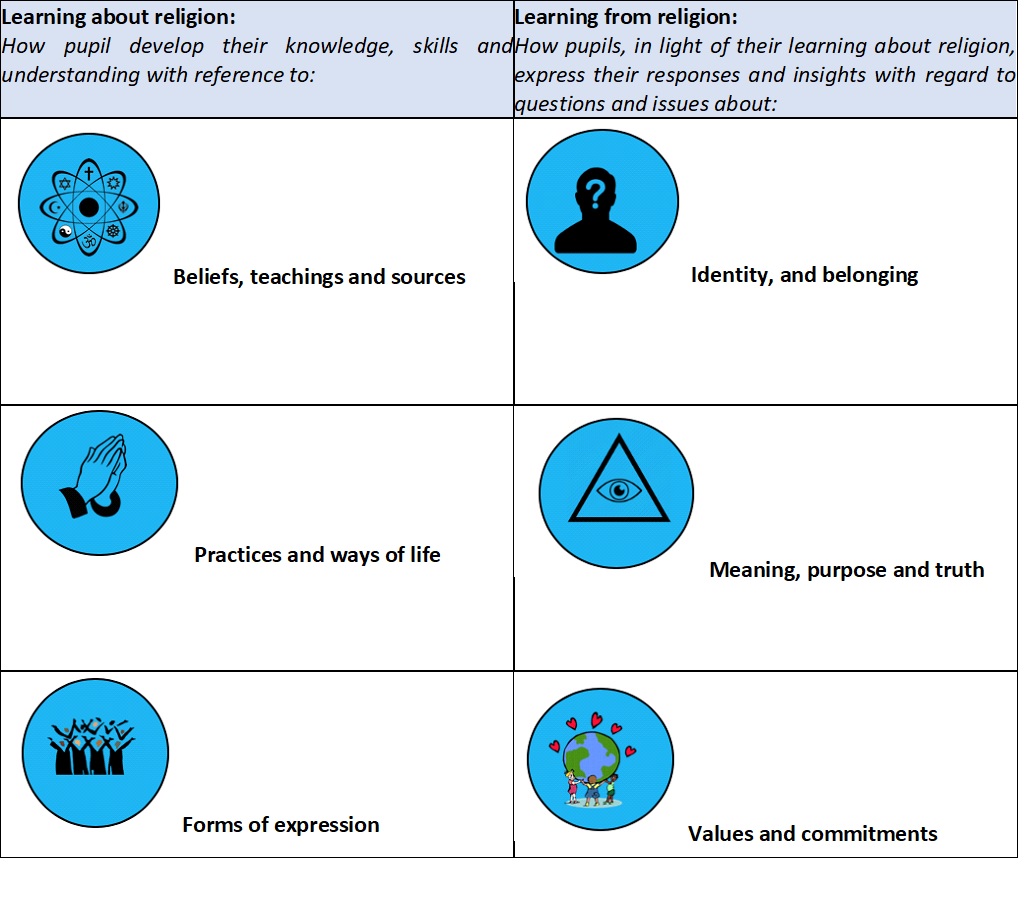Religion and World Views
Purpose and Aims
At NET, our RW curriculum aims to ensure that all pupils acquire and develop knowledge and understanding of the principal religions represented in the UK:
- to appreciate the way that religious beliefs shape our life and behaviour
- to develop the ability to make reasoned and informed judgements about religious and moral issues
- to promote respect and open-mindedness towards others of different faiths and beliefs
- to enhance their spiritual, moral, social and cultural development
The key driver is to engage pupils in an enquiry approach where they can develop an understanding and appreciation for the expression of beliefs, cultural practices and influence of religions and worldviews in the local, national and wider global community.
Organisation of the Curriculum (Implementation):
R&W Skills Domains
At NET Academies to be a theologian, pupils will have the opportunity to develop skills in the following domains:

R&W Strands
Three strands in R&W run throughout the whole curriculum:
|
Know About and Understand:
The first strand seeks to enable pupils to develop a knowledge and understanding of religious beliefs and practices.
Since Christianity has played such a significant part in the historical development of this country, its beliefs and practices feature prominently in the RE programme.
However, the law makes it clear that pupils should also be given opportunities to develop an understanding of the religious beliefs and practices of the other major religions. |
Express and Communicate:
This strand focuses on its contribution to pupils’ spiritual development. Spirituality is a complex area, which transcends any definition. The best we can do is to describe some of its aspects.
Spirituality is concerned with what it is to be human and to make sense of life’s experiences.
It involves trying to find answers to such fundamental questions as ‘Is there life after death?’, ‘Why am I on this earth', ‘Why do innocent people suffer’, and ‘What is right and what is wrong?’.
It is concerned with the development of personal beliefs and appreciating the beliefs of others.
Experiencing a sense of awe and mystery is another key aspect.
It also involves making sense of human relationships and, for some, making sense of a relationship with God. A further aspect is responding to challenging experiences. Whilst every area of the curriculum has the potential to contribute to children’s spiritual development, religious education by its very nature is a key contributor. |
Gain and Deploy Skills:
The third strand is exploring and responding to religion.
This involves the development of positive attitudes and skills. Key skills typically include investigation, empathy, synthesis, interpretation, evaluation, application, reflection, analysis, and expression.
|
Early Years
Key learning experiences
A number of key learning experiences have been identified which should be regarded as entitlements for all pupils in the EYFS:
- Activities based on first-hand experience.
- Opportunities for play and learning that acknowledge children’s particular religious and non-religious beliefs and cultural backgrounds.
- Activities that help children to become aware of, explore and question issues of difference in religion and culture.
- Activities that promote emotional, moral, spiritual and social development alongside intellectual development.
- Positive images in, for example, books and displays that challenge children’s thinking and help them to embrace differences in religion and culture.
Key Stage One
Key learning experiences
A number of key learning experiences have been identified which should be regarded as entitlements for all pupils at Key Stage 1.
Characteristics of Effective Teaching and Learning
These experiences promote the ‘Characteristics of Effective Teaching and Learning’ - displayed through playing and exploring, active learning, and creating and thinking critically.
Opportunities provide pupils with:
- Visit places of worship, focusing on symbols and feelings.
- Listen and respond to visitors from local faith communities.
- Use their senses and have times of quiet reflection.
- Use art and design, music, dance and drama to develop their creative talents and imagination.
- Share their own beliefs, ideas and values and talk about their feelings and experiences.
- Begin to use ICT to explore religions and beliefs as practised in the local and wider community.
Key Stage Two
Pupils learn about Christianity, other principal religions and Humanism, recognising the impact of religion and belief on individuals and society locally, nationally and globally. They also develop awareness of the fact that many people’s beliefs change in the light of their life experiences. This is done in a spirit of respect and open-mindedness, so that barriers, misunderstandings and prejudices are broken down while critical awareness is retained. Pupils make connections between different aspects of religion and consider various forms of religious expression, including the use of symbols. They consider some of the beliefs, teachings, practices and ways of life that are central to religion. In doing this, pupils go beyond the informative, engaging feelings and imagination so as to display a degree of empathy with
different believers. They learn about sacred texts and consider their meanings. They begin to recognise diversity in religion, learning about similarities and differences both within and between religions and belief systems. They extend the range and use of specialist vocabulary. They recognise the challenges involved in distinguishing between ideas of right and wrong, and valuing what is good and true. They communicate their ideas, recognising other people’s viewpoints. They engage at a personal level with important life questions. They consider their own beliefs, values, and those of others in the light of their learning in RE
At NET we follow 'exploRE', the Essex agreed syllabus for Religious Education, selecting the following religions for study:
Christianity
Islam
Judaism
Hinduism
Buddhism
Sikhism
Humanism (KS2)

Planning and Assessment (Impact):
Progression in R&W depends upon the development of the following generic learning skills applied to R&W: share, relate, respond sensitively, describe, connect, show understanding, apply, explain and express views. Progress in R&W is dependent upon the development and application of the skills outlined in our curriculum document. These skills develop a range of activities for pupils to demonstrate their capabilities in R&W. Similarly, teachers will move pupils on from knowledge accumulation and work that is merely descriptive to higher level thinking and more sophisticated skills.

Teachers will deploy ongoing skills assessment within each unit, in addition to the final outcome objectives, to record progress and learning effectively.
Enrichment:
Our curriculum is enriched by visits to a range of Places of Worship; chosen to foster a sense of awe and wonder. We invite visitors into the school to talk to children about their knowledge/experience regarding a particular faith thus giving our children a deeper understanding of belief and faith. Moreover, units of learning in all year groups (EYFS through to Year 6) aim to follow a thematic approach to aid oracy, communication and expressive language.

 Jerounds
Jerounds